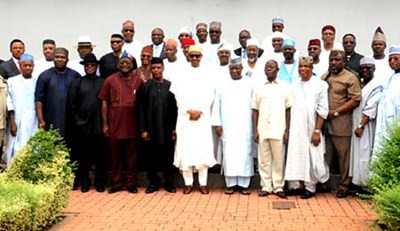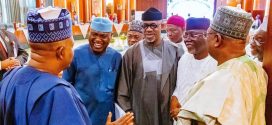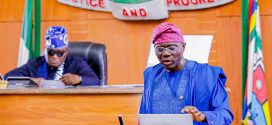The National Economic Council (NEC) has revealed that the Nigerian National Petroleum Corporation (NNPC) spent N3.8 trillion in three years without approval.
The latest indictment of NNPC, confirmed the forensic audit report by PricewaterhouseCoopers (PwC) and the 2012 report of the Presidential Committee on the Verification of Fuel Subsidies, which both revealed that the corporation deducts as much as 46 per cent of oil receipts to meet its expenditure before remitting the balance to the Consolidated Revenue Fund (CFR).
The revelation was made when the Edo State Governor Adams Oshiomhole in the company of his Kaduna and Zamfara counterparts, Nasir el-Rufai and Abdulazeez Yari, briefed State House correspondents after the inauguration of the National Economic Council (NEC) at the Presidential Villa, Abuja, monday.
Oshiomhole said at the NEC meeting, which was the first by this administration, President Muhammadu Buhari instructed that the NNPC and the office of the Accountant General of the Federation were compelled to provide information in black and white on issues as they relate to the sale of the nation’s crude oil from 2012 to May 2015.
Oshiomhole said: “We are talking about transparency, we are talking about change. And what we saw from those numbers, I believe that Nigerians are entitled to know, is that whereas the NNPC claimed to have earned N8.1 trillion, what NNPC paid into the Federation Account from 2012 to May 2015 was N4.3 trillion.
“What it means is that NNPC withheld and spent N3.8 trillion. The major revelation here is that the entire federation, that is, the federal government, the states and all the 774 local governments, the amount the NNPC paid into the Federation Account for distribution to this three tiers of government came to N4.3 trillion and NNPC alone took and spent N3.8 trillion.
“Which means that the cost of running NNPC was much more than the cost of running the federation; that tells you how much is missing, what is mismanaged, what is stolen and these are huge figures.
“We need to earn and spend, it is basic law in accounting that even if you run a cigarette shop where you sell Three-Rings (a cigarette brand), you don’t sell and spend. You sell, take to your bank account, and you budget for your procurement including cost of running your business.
“There is no enterprise manager who goes to the market and sells and just begin to spend, otherwise nobody needs to budget.
“And because you are running a democracy and you are running three tiers of government, and the resources involved belong to the three tiers of government, the only lawful way decreed by the constitution, this is not an administrative regulation, it is not a policy derivable from a circular, this is from the express letter and spirit of the Nigerian Constitution, as amended.
“So if NNPC, for example, needs to spend money, it is obliged to prepare its budget like every other business enterprise. That budget will be scrutinised by the executive and forwarded to the National Assembly and the National Assembly will accordingly appropriate it.
“If the federal government cannot spend without appropriation, why should any agency spend without appropriation? NIMASA (Nigerian Maritime Administration and Safety Agency), for example, whatever they earn, they are supposed to pay into Federation Account and also present their budget on their requirements. This is what the constitution provided for.
“And this is what President Buhari has promised to do that henceforth all monies must go to the Federation Account. What you need, you budget for. Nigeria cannot continue with NNPC earning the money and spending it.
“Where is transparency? Where is the role of the National Assembly? If they were doing their job, you won’t have a situation where the NNPC alone will spend N3.8 trillion and remit to the federal, states and local governments N4.3 trillion which means NNPC is taking about 47 per cent and that explains all the leakages we are talking about.”
Continuing, the Edo State governor said: “Nobody is saying that parastatals should not spend money but they must return to budgeting. There is no major player, there is no major registered private company that will spend money without a budget.
“Even in a private company, you will have your board of directors looking at your revenue, total sales, your turnover, your personnel cost, running cost, visibles and invisibles and you have the budget for the year; that is how every sensible business runs.
“That is the way it was when President Buhari was Minister of Retroleum. So we are not reinventing the wheel, because that is the way it used to be and that is the way the constitution says it should be.”
Oshiomhole explained that council also reviewed the status of the Excess Crude Account (ECA), stating that the last time the former Coordinating Minister for the Economy and Minister of Finance, Ngozi Okonjo-Iweala, had reported to the council in November 2014, the account had $4.1 billion “but today the Accountant General Office reported we have $2.0 billion. Which means the Honourable Minister spent $2.1 billion without authority of the NEC”.
He alleged that the money from the ECA was not distributed to the states and local governments, adding: “This is why the NEC has set up a panel to look at what accrued, what it was spent for, when and by whom, so that Nigerians will have the full picture of all the transactions as regards the much talked-about Excess Crude Account.”
In his briefing, el-Rufai said the ECA was started by former President Olusegun Obasanjo around 2004 or 2005, confirming that he was in the administration and was part of the team that established the account.
“I was part of the decision that led to the creation of the Excess Crude Account. It was an administrative arrangement to save for a rainy day. And it was meant to have very clear accountability such that every state and local government, in a particular, knew their balances in the Excess Crude Account. Though you could not spend it, but you knew how much of it was yours.
“That was the arrangement, and in those days, before we spent any money from the Excess Crude Account, the federal and state governments will meet and agree. That is how we agreed to build the seven power stations, which are the NIPPs today, it was from Excess Crude Account.
“And we also met and agreed to build the Lagos-Kano standard gauge rail line from the Excess Crude Account. But what we have seen in the last few months or years is that the Excess Crude Account was operated unilaterally by the federal government, drawings were made unilaterally without consulting those that actually own the money because the Excess Crude Account is 52 per cent owned by the federal government and 48 per cent by the states and LGAs.
“So the decision of the NEC is to set up this committee of four to look at the operations of the Excess Crude Account and make recommendations to council on its future.
“The other thing the committee will do is to look at the operations of the Federation Account, particularly the shortfall, and again come back to council with very clear recommendations as to what to do.
“We have not been given a timeframe but as you can imagine, state governments are under pressure; many of our state governments are unable to pay salaries on time without recourse to borrowing, so this is very important to us.
“This is an all governors’ committee, we wear the shoe and we know where it pinches. So we are going to do this as quickly as possible.
“The next meeting of the council is on July 23 and we hope to complete our work and be in the position to report to council on that day. So within the next one month, we will be done by God’s grace,” the Kaduna State governor said.
Providing further insight, Yari said the NEC meeting was briefed by the Accountant General of the Federation and the state of the economy was discussed thoroughly by the members of the council.
“We received the report on the Excess Crude Account, what is there and what is not there. And also the council got the briefing on the unremitted funds by NNPC.
“In this regard, a four-man committee comprising the Edo, Gombe, Kaduna and Akwa Ibom governors was constituted to go through the books of NNPC and Excess Crude Account as well as the Federation Account.
“The four-man committee will check the books of NNPC, most specially the issue of the excess crude and what was not remitted into the Federation Account.
“The FG, in conjunction with the CBN, will also look inwards to see how to support and how much they will give to states, especially to cater for the issue of outstanding salaries owed by the states and even the federal government,” Yari said.
In a related development, Nigeria’s ruling party, the All Progressives Congress (APC), has advised the federal government to discard the long-delayed Petroleum Industry Bill (PIB), review fuel subsidies, sell off some units of the state petroleum company and wants the senior management of the NNPC to declare their assets.
“The Petroleum Industry Bill should be scrapped and replaced by a new reform bill that’s based on discussions with international oil companies (IOCs) to ensure all perspectives are adequately considered,” the APC said in a report obtained by Bloomberg yesterday.
Kayode Fayemi, the APC’s policy director, confirmed the authenticity of the document.
The bill has been delayed in parliament for six years due to political wrangling and opposition by international energy companies against proposed tax and royalty terms, deterring investment in Africa’s top oil producer.
The APC handed the report, which was based on closed-door meetings on May 20 and 21 in Abuja to President Buhari, who took office on May 29 but is yet to appoint a cabinet. The report “is not the final position of government,” Fayemi said by e-mail.
Buhari defeated Goodluck Jonathan in March 28 election on pledges to clamp down on graft, including the oil industry, which is the source of about two-thirds of the government’s revenue and 90 per cent of export earnings.
The report also made recommendations for a review of audits and corruption allegations against the state-owned NNPC in the government’s first 100 days in office.
After 18 months, the government should seek to commercialise the NNPC, possibly partially listing the entity and selling off its fuel-retailing and refining business, the APC said.
Buhari disbanded the NNPC board last week in an attempt to fight graft in the industry. Two calls to the mobile phone of Ohi Alegbe, the NNPC spokesman, didn’t connect yesterday and he didn’t immediately reply to an e-mail seeking comment.
The APC report recommends that all top oil executives, senior NNPC staff and government officials must declare their assets. It also called for the state oil company’s board to meet more regularly and the legislation governing the NNPC to be amended to ensure that the petroleum minister is no longer chairman of the company.
The government should review fuel subsidies to reduce costs of about N600 billion ($3 billion) spent annually on the payments, according to the report.
Buhari said last week that his government was facing severe financial strain from a treasury that’s “virtually empty” and billions of dollars in debt.
A lack of oil refining capacity means Africa’s largest economy subsidises gasoline imports and suffers frequent fuel shortages even though it produces about 1.9 million barrels of crude oil a day.
Nigeria’s crude production is hindered by the NNPC’s inability to pay its share in joint ventures with companies including Exxon Mobil Corp., Royal Dutch Shell Plc and Total SA, according to the report.
NNPC’s debts to its eight joint ventures, in which it owns majority stakes, have “ballooned over the years,” the APC said. In 2012, the state company paid $6.9 billion out of the $10.4 billion it owed. The difference of $3.5 billion was covered by loans from international oil companies, according to the report.
“These debts are costly and opaque, and they erode the NNPC’s bargaining power with” the oil companies, APC said in the report. “Nigeria’s inability to fund its joint-venture budgets is delaying projects, reducing production, and lowering revenue collection for the nation.”
The NNPC had the worst disclosure record of 44 international and national energy companies analysed in a 2011 report by Transparency International (TI) and the Revenue Watch Institute (RWI).
The APC’s report also advised the government to cancel in its first 100 days in office “two ill-suited and costly offshore processing agreements” that were signed in the fourth quarter with Aiteo Eastern E&P Co. Limited and Sahara Group of 90,000 barrels per day each.
The government should sign simpler swap agreements with “highly competent” trading companies through a tender process, according to the report.
Sahara said it wasn’t aware of the APC’s recommendation, and Aiteo didn’t immediately respond to an e-mailed request for comment.
“The parties involved remain committed to the terms of the contract, which is being carried out in line with best practices and good governance,” Sahara said in a statement.
 Hottestgistnaija.com
Hottestgistnaija.com





